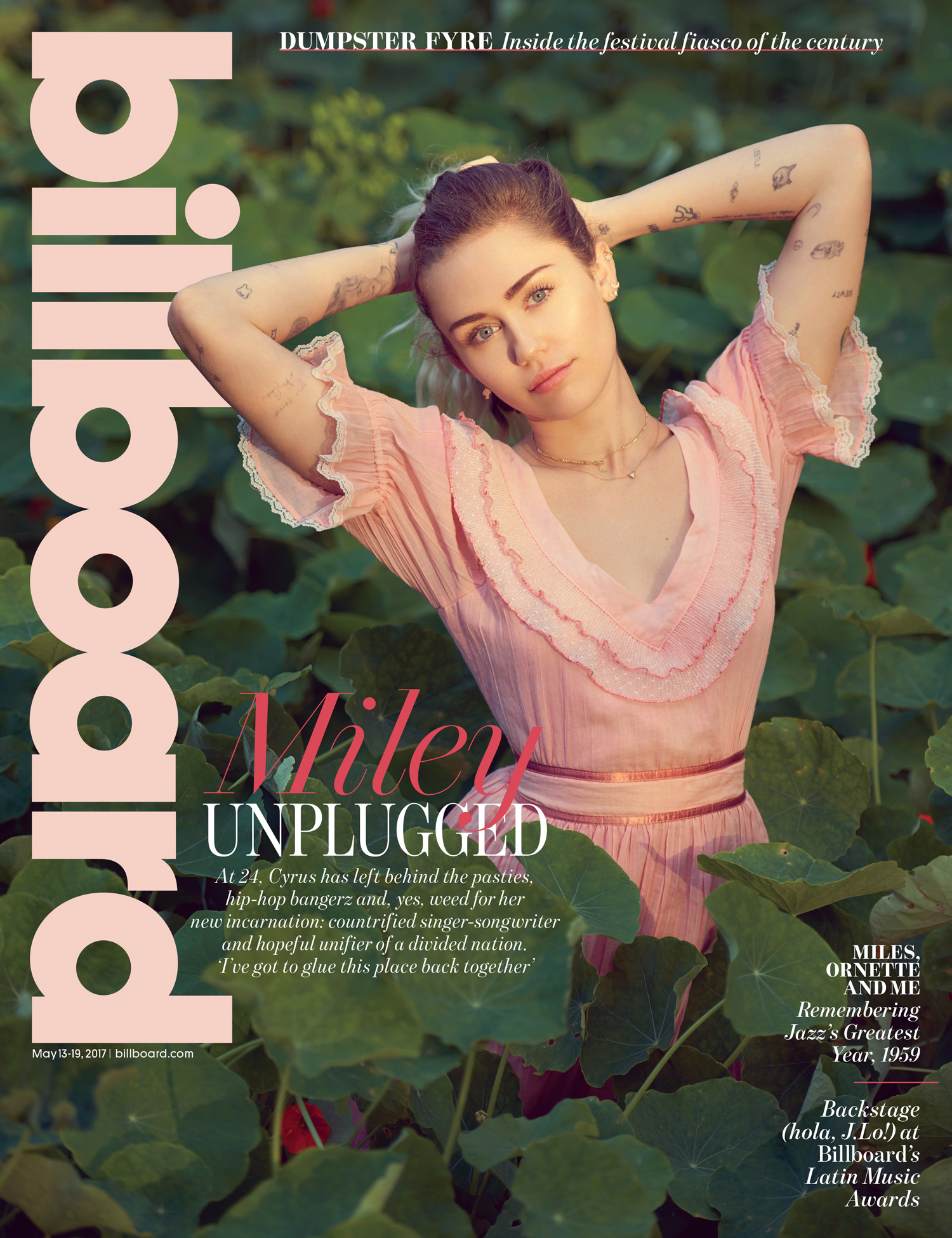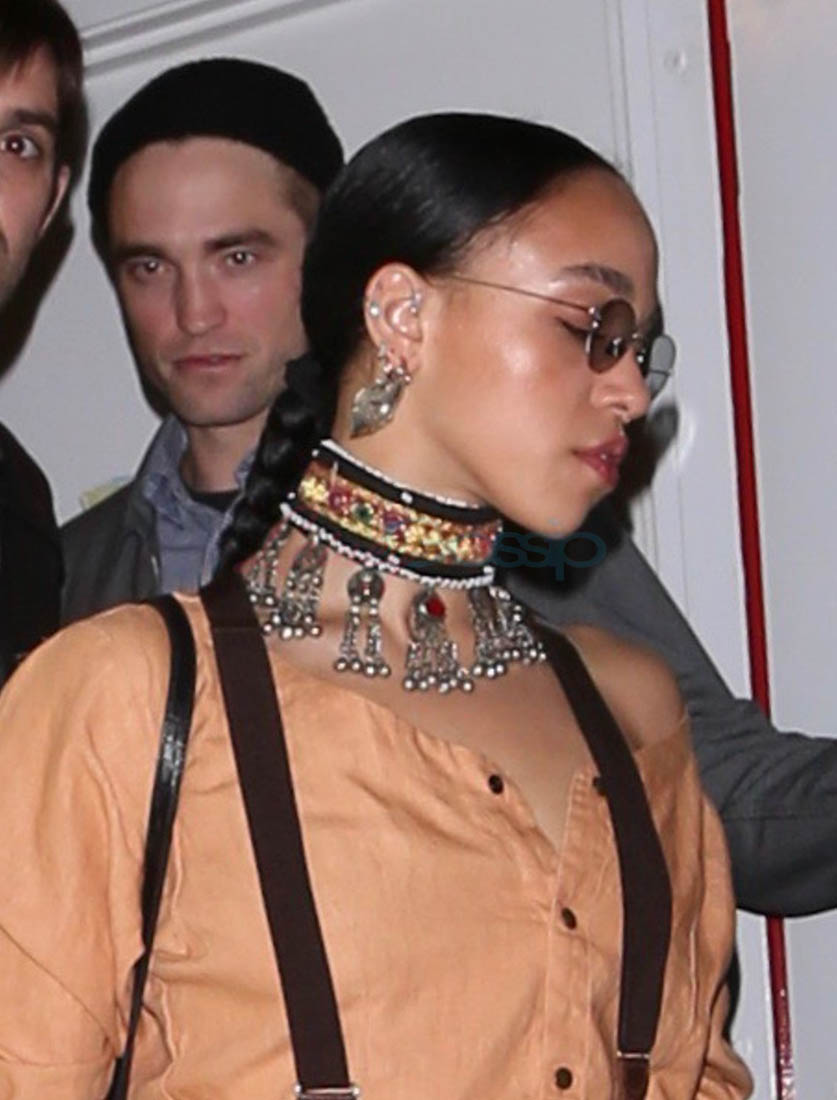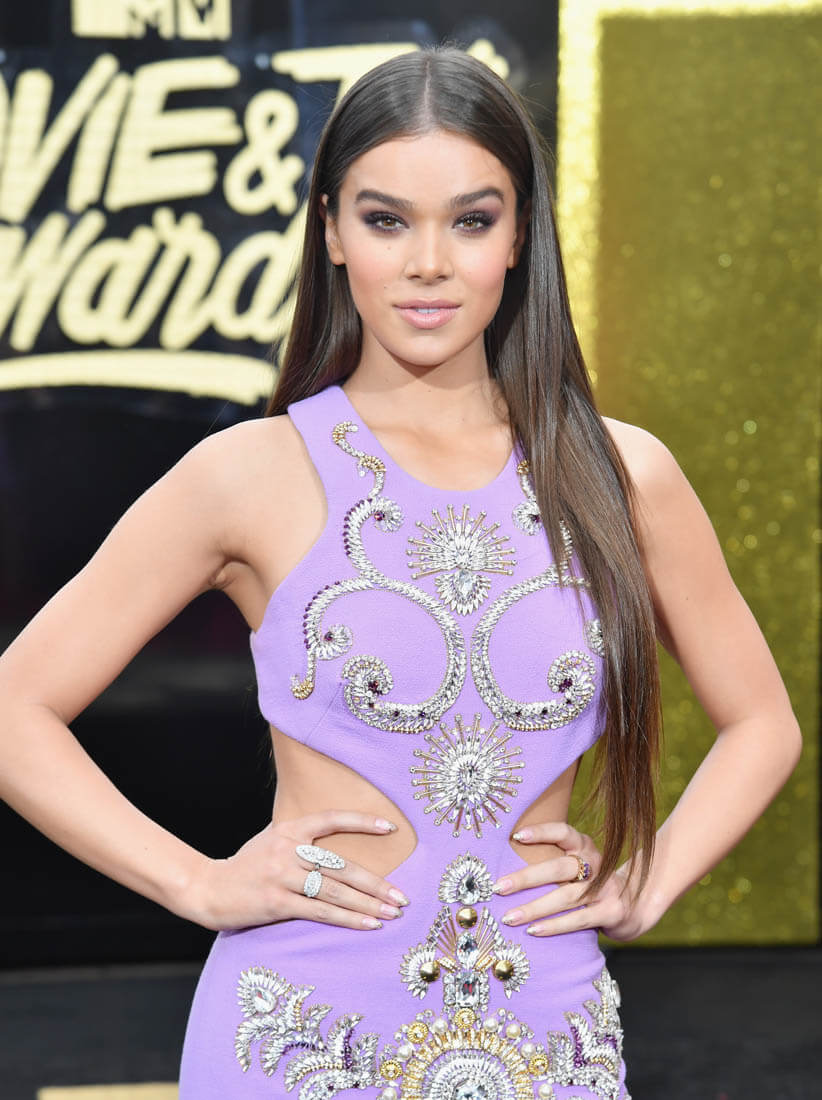Miley’s new image



Miley Cyrus is attempting a rebrand... again. Miley’s new single drops this week and in anticipation of its release, she’s on the cover of Billboard. In the interview, posted last Wednesday, Miley’s new sound is described as “rootsy” – whatever that means – and she revealed that she’s purposefully distancing herself from hip-hop and “certain producers”:
“…I also love that new Kendrick [Lamar] song [“Humble”]: “Show me somethin’ natural like ass with some stretch marks.” I love that because it’s not “Come sit on my dick, suck on my c-ck.” I can’t listen to that anymore. That’s what pushed me out of the hip-hop scene a little. It was too much “Lamborghini, got my Rolex, got a girl on my c-ck” — I am so not that.”
She also said this about that time she used black women as props in her music videos.
“It’s mind-boggling to me that there was even a controversy around me having black dancers. That became a thing, where people said I was taking advantage of black culture, and with Mike [WiLL Made-It] -- what the f-ck? That wasn’t true. Those were the dancers I liked!”
Miley has since attempted to clarify these comments by using a variation of the tired “my words were taken out of context” excuse so before I get to her non-apology, I want to put this into context. These quotes need to be digested together because Miley’s current take on hip-hop and her history of cultural appropriation exist in tandem. They are both directly related to her career trajectory. There are a couple of buzzwords that sum up what is going on in these quotes: problematic and privilege –words that are thrown around so often now (mainly because so many public figures are problematic and privileged) that they may make you want to roll your eyes and tune out. A lot of people might chalk this whole controversy up to outrage culture and move on. But Miley’s words here are important because they expose a deeper, unsettling trend among white artists and their exploitation of black culture. We all watched Miley Cyrus use black dancers, rappers, producers and twerking to propel her from Hannah Montana to credible pop star endorsed by prominent members of the hip-hop community like Jay Z, Snoop, French Montana, and Pharrell. According to producing duo Rock City, when Miley was working on her album Bangerz, she specifically asked for, “something that just feels Black.” But, you know, those were just the dancers she liked!
Miley Cyrus used hip-hop and black bodies to create an image of a rebellious, mature, sexually-liberated woman and to score a double platinum-selling album only to reduce the genre to cheap stereotypes and discard it as a phase. The “come sit on my dick” rap that Miley so eloquently described is the exact lane of hip-hop she manipulated. It’s also a condescending dismissal of an entire subsection of music that has been used repeatedly to discredit hip-hop. It’s the same argument bitter white men use every year when a hip-hop act gets inducted into the Rock and Roll Hall of Fame. It’s the same antiquated thinking that led to decades of rappers going overlooked as credible songwriters.
Stereo Williams for The Daily Beast wrote a piece called “Miley Cyrus’ Gross Racial Tourism” in which he expertly breaks down Miley’s ignorance and the pattern of appropriation in pop music.
“Hip-hop is more than gold grills and twerking, but when white pop stars want to push buttons, they are more than happy to latch onto an easy hip-hop caricature to do it… it’s all too easy to appropriate blackness in the most reductive way, then move on when they’ve decided they’re over that particular “phase” of their life and career.”
It’s like a rite of passage in pop. Want to be grown and sexy? Want to shed that child star image? Get some black producers and throw in a verse from whichever artist is currently taking up that party rap space. Rinse, repeat. Then, when it’s no longer useful to you, tell everyone it was just a phase. As Williams noted, Mark Wahlberg and Kid Rock did the same. Christina Aguilera comes to mind.
The reaction to Miley’s abandonment of a genre that made her was met with rightful criticism so she took to Instagram to clarify her comments.
When articles are read it isn't always considered that for hours I've spoken with a journalist about my life , where my heart is, my perspective at that time, and the next step in my career. Unfortunately only a portion of that interview makes it to print, & A lot of the time publications like to focus on the most sensationalized part of the conversation. So, to be clear I respect ALL artists who speak their truth and appreciate ALL genres of music (country , pop , alternative .... but in this particular interview I was asked about rap) I have always and will continue to love and celebrate hip hop as I've collaborated with some of the very best! At this point in my life I am expanding personally/musically and gravitating more towards uplifting, conscious rap! As I get older I understand the effect music has on the world & Seeing where we are today I feel the younger generation needs to hear positive powerful lyrics! I am proud to be an artist with out borders and thankful for the opportunity to explore so many different styles/ sounds! I hope my words (sung or spoken) always encourage others to LOVE.... Laugh.... Live fully.... to be there for one another... to unify, and to fight for what's right (human , animal , or environmental ) Sending peace to all! Look forward to sharing my new tunes with you soon! - MC
A post shared by Miley Cyrus (@mileycyrus) onMay 5, 2017 at 10:36pm PDT
Insert face palm emoji. First, let’s address the defense that, “only a portion of that interview makes it to print” and that her words have been sensationalized. The format of most of the Billboard piece is Q&A. The writer is not extrapolating meaning from disjointed soundbites. Above, I quoted Miley’s answers in full, complete sentences. In this clarification post, she never once denies that she said what she said. The tone of her post is in line with so many statements we’ve seen from celebs after they mess up: The Internet’s mad again! And their response is something like, “Why you so mad Internet? I’m just a wee little good celebrity who loves ALL people. Stop being so mean to me!” The “all” is always in caps. Justin Timberlake and Ellen Pompeo are some recent examples. In Miley’s case, the emphasis on ALL is a direct slap in the face to the specificity of what she is being called out for. She’s ignoring her exploitation of black culture by saying she only spoke about hip-hop because it happened to be the genre she was asked about, “in this particular interview.” Miley’s first big hits name check Jay Z or were produced by Mike Will Made-It, Pharrell and Timbaland! THIS IS THE GENRE THAT GAVE YOU A POST-DISNEY CAREER. Through black culture, Miley Cyrus was able to carve herself out as pop’s outsider and a nonconformist with genuine authenticity. It worked so well that I bought it. I was finally coming around to Team Miley before this bullsh-t. I know you can’t be right all the time and if, let’s say, Miley had gone the Lena Dunham route and actually apologized, owning up to her ignorance, I might not feel so guilty about having We Can’t Stop stuck in my head at all times. Miley clearly doesn’t understand why she’s being called out for cultural appropriation but the bigger problem is that she isn’t trying to understand. She has dismissed every criticism instead of listening and learning from the members of the culture she’s ripped off.
The f-cking privilege and audacity it takes to call yourself an “artist without borders” when you’ve been able to put on and take off your warped idea of blackness as you please is astounding to me. Aside from being rap-free, Miley’s new image is one of sobriety and domesticity. She’s back to being a good, country girl who just wants “unity.” The Billboard article is full of quotes alluding to the fact that Miley wants to come together with Trump voters. She stumped for Hillary but now she’s sober and thinks ‘Merica needs harmony. Also, in case you wanted a side of nepotism with that privilege she’s serving, Miley also wants to remind country fans that her godmother is Dolly Parton and she’s done with nipple pasties. Once more for the Trump supporters in the back, Miley has given up weed, partying, raunchy clothing and hip-hop. See, she’s clean and sober. Feel free to embrace her again. No need to be scared. This is a strategic play for the country base and it’s insulting that rap music is being lumped into the bad habits Miley is shedding now that she’s running through open fields and wearing cowboy boots again. On Thursday, we’ll get to hear the “rootsy” music that is the soundtrack of Miley’s rebrand and see if middle America accepts her back with open arms. If they don’t, how long before she’s running to Migos for some verses?

